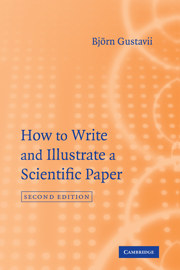Book contents
- Frontmatter
- Contents
- Preface
- Acknowledgments
- 1 Basic rules of writing
- 2 Comments on scientific language
- 3 Drafting the manuscript
- 4 Choosing a journal
- 5 Preparing a graph
- 6 Drawings
- 7 Figure legends
- 8 How to design tables
- 9 Title
- 10 Authors
- 11 Abstract
- 12 Introduction
- 13 Methods
- 14 Results
- 15 Discussion
- 16 Acknowledgments
- 17 References
- 18 Ph.D. and other doctoral theses
- 19 Letters and case reports
- 20 Numbers
- 21 Abbreviations
- 22 How to present statistical results
- 23 Typing
- 24 Dealing with editors and referees
- 25 Correcting proofs
- 26 Authors‘ responsibilities
- Literature needed on your desk
- Further reading
- Literature cited
- Index
18 - Ph.D. and other doctoral theses
Published online by Cambridge University Press: 05 June 2012
- Frontmatter
- Contents
- Preface
- Acknowledgments
- 1 Basic rules of writing
- 2 Comments on scientific language
- 3 Drafting the manuscript
- 4 Choosing a journal
- 5 Preparing a graph
- 6 Drawings
- 7 Figure legends
- 8 How to design tables
- 9 Title
- 10 Authors
- 11 Abstract
- 12 Introduction
- 13 Methods
- 14 Results
- 15 Discussion
- 16 Acknowledgments
- 17 References
- 18 Ph.D. and other doctoral theses
- 19 Letters and case reports
- 20 Numbers
- 21 Abbreviations
- 22 How to present statistical results
- 23 Typing
- 24 Dealing with editors and referees
- 25 Correcting proofs
- 26 Authors‘ responsibilities
- Literature needed on your desk
- Further reading
- Literature cited
- Index
Summary
The Ph.D. (Philosophiae Doctor) is the highest university degree. It is acquired after writing a doctoral thesis (or dissertation) and defending it at an oral examination.
There are almost no generally accepted rules for thesis preparation. The structure varies from country to country, “from institution to institution and even from professor to professor in the same department of the same institution” (Day and Gastel 2006).
However, theses are of two kinds: monographs and compilations of articles. Monographs are the most common form, especially in the humanities, theology, and law. But compilations are increasingly used in medicine, technology, and the natural sciences.
Compilations: the theses of the future
Compilations are based on articles that have “been scrutinized by international peer review, probably more prestigious than local committees” (Carling 2006). They are recognized in Argentina, Australia, India, Japan, the United States, and in such European countries as the Czech Republic, Finland, Germany, the Netherlands, Norway, Spain, and Sweden; they are permitted in the United Kingdom, but are not common there (Burrough-Boenisch 2006).
Compilations are of two types. In one, the reprinted articles are sandwiched between introductory and concluding chapters. In the other, the reprinted articles are appended to a summary of their contents. In both types, the articles are published or publishable in refereed journals and often have several authors, with the doctoral student as first author of most of them. The subject of this chapter is the type of compilation that includes a summary; for lack of an official name, I propose to call that summary a thesis overview.
- Type
- Chapter
- Information
- How to Write and Illustrate a Scientific Paper , pp. 91 - 100Publisher: Cambridge University PressPrint publication year: 2008



